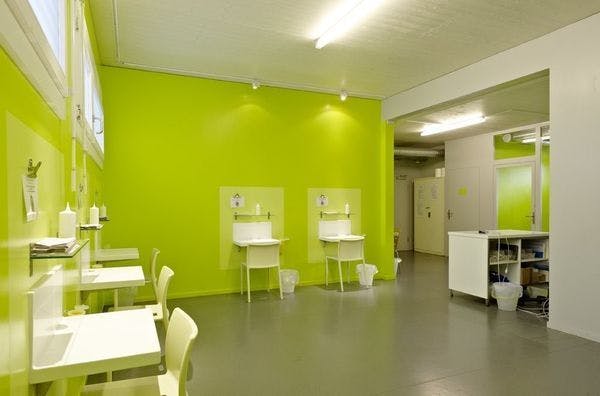KO Studio
Las salas de consumo de drogas llegan a Eslovenia: entrevista con Katja Krajnc
La ONG Stigma y la ONG Šent reflexionan sobre la mejor forma de acoger a las personas desde 2024. Más información, en inglés, está disponible abajo.
After decades of advocacy by civil society, the government finally approved the opening of the first drug consumption room in Slovenia. On this occasion we interviewed Katja Krajnc from the NGO Stigma, a leading harm reduction organisation in the country.
Drugreporter: Can you talk a bit about your own background? How and why did you choose to work in the field of harm reduction? What work do you do for the organisation?
Katja Krajnc: I think that in choosing this field, the work, in a way, chose me. Even when I was a student and occasionally passed by the drop-in centre of the NGO Stigma, I often envisioned working for this organisation. After completing my studies, I had the opportunity to be employed by the association, and I have stayed here ever since. In my opinion, working in the field of harm reduction is not for everyone. Anyone who takes a job in harm reduction must start from the belief that drug use is a matter of personal choice and a human right to bodily integrity. It is necessary to be aware, without moral judgments and a patronising attitude, that there are people who, for various reasons, cannot or do not want to stop taking drugs.
The NGO Stigma is one of the leading harm reduction organisations in Slovenia. What is the story of Stigma? When and why was it established?
That’s right. The Harm Reduction Association Stigma is the first organisation that began operating in the field of harm reduction in Slovenia. The NGO was founded in 1990, and through its collaboration in the project ‘Preventing AIDS through the organization of aid and self-help for drug users,’ we established a framework for harm reduction in Slovenia. During this period, drug use increased, reflected in a higher number of overdose deaths and more frequent responses to drug issues in the media. Initiatives by drug users began to emerge as a reaction to repressive policies and moralistic treatment. With these initiatives, they sought to assert the right to health care, soon followed by the right to protection against infectious diseases, and, ultimately, destigmatisation of their social role. Stigma was formed as a collaboration project between drug users and professionals, with the aim of reaching out to those drug users who were labelled as “hard to reach”.
The choice of the name Stigma is aimed at drawing attention to the problems of the marginalisation and exclusion of a population, which, due to its hidden nature and life on the social fringes, is even more exposed to risks and dangers resulting from drug use.
What kind of services do you provide to people who use drugs?
Our NGO has two drop-in centres where needle exchange takes place, which is the basic measure and starting point for all other harm reduction approaches. Unhindered access to sterile equipment is a preventive measure and at the same time provides access to the largest number of intravenous drug users. The program provides free sterile equipment such as insulin syringes, various needles and syringes, cookers or spoons with filters, condoms, needle disposal containers, and informational materials.
Returning used needles is part of the needle exchange program, but returning a used needle is not a condition for issuing a sterile one. In the drop-in centre, we also provide counselling and practical assistance. Counselling is initiated by users who have contacted us personally, by phone, or online, within the framework of the drop-in centre program or mobile needle exchange through outreach. We assist people who use drugs access various services, such as opioid agonist treatment, and support them to find housing and jobs.
In addition, we have an outreach program to contact drug users in the initial phase of their drug use and try to reduce the harm that drug use could cause them. Our outreach workers step out of offices and counselling rooms to meet drug users in their environment, providing them with sterile injection equipment, necessary information, and incentives to follow safety instructions in drug use. If a need for more targeted treatment arises during a conversation, the person is invited to visit the drop-in centre, where we continue to address their situation.
